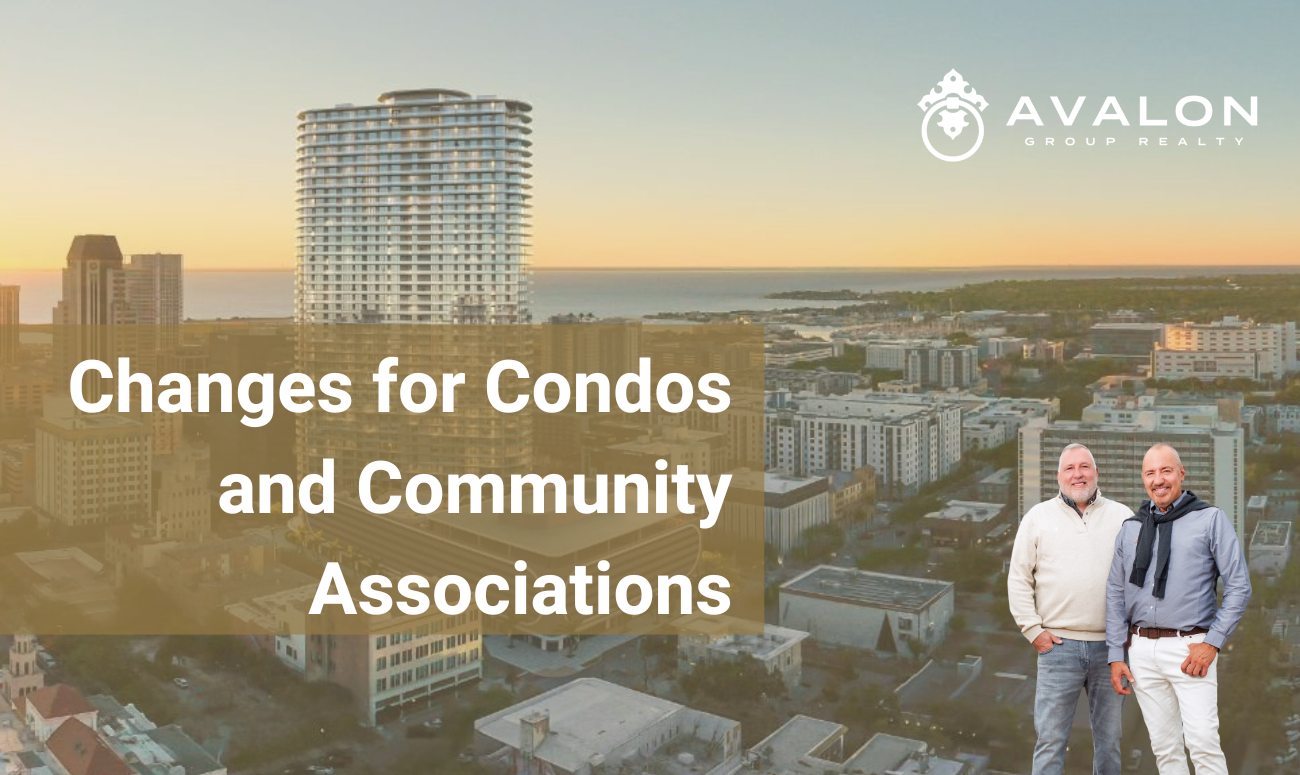Changes for Condos and Community Associations
It’s been several years since the changes to condo laws and I thought it might be good to focus in on these again. With all the changes the real estate landscape continues to evolve. Furthermore, the most significant recent shifts are those affecting condos and community associations. Understanding these changes is critical for buyers, sellers, and property owners alike. As Aaron Hunt, Broker of Avalon Group Realty, says, “Navigating these legal updates ensures our clients make informed decisions and avoid unnecessary pitfalls.”
A Closer Look at Senate Bill 630
Signed into law on July 1, 2021, Senate Bill 630 introduced substantial revisions to how community associations operate in Florida. This law impacts homeowners, condominium, and cooperative associations under Chapters 718, 719, and 720 of Florida Statutes. It eliminated discriminatory restrictions in recorded title transactions, reinforcing the legal advancements of 2020 that abolished discriminatory language in deeds.
Key Changes for Homeowners’ Associations
Senate Bill 630 brought several adjustments to homeowner associations (HOAs):
- Digital Communication: Associations can now post meeting notices and agendas on a website and email them to members. This shift modernizes communication and ensures members stay informed.
- Enhanced Record-Keeping: Sign-in sheets, voting proxies, ballots, and related voting documentation are now official records, bolstering transparency.
- Confidentiality for Guests: Information about guests visiting residents in gated communities is confidential, adding a layer of privacy protection.
- Prospective Rental Restrictions: Amendments to governing documents restricting rentals can only apply prospectively. As Pam Amante, a fellow Realtor at Avalon Group Realty, explains, “This change protects homeowners’ existing rights while still allowing HOAs to adapt policies to future needs.”
- Clearer Payment Deadlines: Fines must be paid within five days of receiving notice, ensuring fairness and clarity for members.
Expanded Protections for Condominium Associations
Condominium associations saw adjustments aimed at increasing transparency and adaptability:
- Streamlined Record Retention: Official records for bids now only need to be maintained for one year, down from seven, reducing administrative burdens.
- Tech-Friendly Accessibility: Associations with 150+ units can make records accessible through downloadable mobile apps, simplifying access for owners.
- Board Member Term Limits: Only service after July 1, 2018, counts toward calculating term limits, ensuring a consistent governance structure.
- Increased Fees: Transfer fees rose from $100 to $150, with future adjustments tied to the Consumer Price Index (CPI), reflecting inflationary trends.
- Expanded Emergency Powers: Associations can now address injuries and states of emergency more effectively, a significant step toward ensuring safety.
- Electric Vehicle Charging Stations: Unit owners may install electric or natural gas vehicle charging stations in their designated parking areas, bearing all associated costs. “This reflects the growing emphasis on sustainability,” adds Yvette Kim, an Avalon Group Realty Realtor.
Cooperative Associations: A New Era
For cooperative associations, Senate Bill 630 redefines ownership and operational protocols:
- Real Property Classification: Cooperative units are now officially recognized as real property, offering clearer legal standing.
- Modernized Meetings: Board and committee members can attend and vote via real-time video conferencing, enhancing flexibility.
- Enhanced Emergency Powers: Similar to condos, cooperatives gain additional authority to manage property emergencies effectively.
Senate Bill 56: Improved Assessment Notices
Effective July 1, 2021, Senate Bill 56 revamped how associations handle assessment notices:
- Mandatory Delivery: Notices must be sent by first-class mail or electronically, with prior acknowledgment of delivery methods from owners. This ensures owners are well-informed.
- Attorney Fee Restrictions: Associations must provide a written notice of late assessments before charging attorney fees, protecting owners from unexpected costs.
- Extended Lien Deadlines: Owners now have 45 days to address past-due assessments before a lien claim is recorded, giving them more time to resolve issues.
Insights from Avalon Group Realty
“These changes are about fairness and ensuring associations operate transparently,” says Nora Sturgill, another Realtor at Avalon Group Realty. She highlights how the new rules safeguard homeowners from unexpected fees and legal complications.
SB 286 and SB 76: Specialized Updates
- SB 286: Adjusted fire sprinkler contractor requirements, enabling Contractors I and II to manage alterations involving up to 49 sprinklers under specific conditions. This change improves safety compliance while reducing unnecessary costs.
- SB 76: Overhauled property insurance laws, reducing the deadline for filing claims from three years to two. It also limited incentives for roofing inspections and imposed stricter guidelines for lawsuits against insurers. “This law prioritizes responsible property management,” notes Josh Zanow, an Avalon Group Realtor.
Post-Surfside Safety Measures: SB-4D and SB-154
Following the tragic Surfside condo collapse, Florida enacted laws to bolster building safety:
Inspection and Reporting Requirements
By December 31, 2024, condos occupied before 1992—or those 25 years old within three miles of the coast—must undergo milestone inspections by architects or engineers. Findings must be disclosed to local authorities, unit owners, and potential buyers. If repairs are needed, associations must address them without owner votes.
“This level of scrutiny is essential for safety in older buildings,” explains Aaron Hunt, highlighting how the measures protect both lives and property investments.
Reserve Fund Mandates
Building associations must budget for reserves to cover wear-and-tear repairs on critical components like roofs and elevators. “These regulations ensure associations are financially prepared for future needs,” explains Aaron Hunt. Yet, many owners face financial strain adapting to these funding requirements, sparking debates about balancing affordability and safety.
The True Cost of Coastal Living
With nearly 1 million condo units in Florida aged 30+ years, these changes reflect the rising cost of maintaining coastal properties. “These laws aim to make condo living safer and more transparent,” says Rob Johnson. While some residents view the adjustments as burdensome, they ultimately enhance property value and security. “The long-term benefits far outweigh the short-term challenges,” adds Nora Sturgill.
Understanding the Impact of Florida’s New Condo Laws on Residents
Florida’s new condominium laws, SB-4D passed in 2022 and its follow-up SB-154 enacted in 2023, are among the most significant legislative changes affecting condo owners in decades. While they aim to improve safety and transparency, the financial repercussions have left many residents grappling with increased fees, assessments, and maintenance costs. Nearly one million condo owners face an approaching deadline to comply with these laws, making it critical to understand what they entail and their broader implications.
Breaking Down the Key Provisions
These laws introduce three main requirements: mandatory milestone inspections, enhanced transparency and reporting, and adequate reserve funding. These measures address building safety, especially in older structures, and ensure sufficient resources are available for necessary repairs. Here’s a detailed breakdown:
1. Mandatory Milestone Inspections
Under the new laws, any building occupied before 1992 must undergo a milestone inspection by December 31, 2024. This requirement also applies to buildings at least 25 years old located within three miles of the coast. The inspection involves evaluating the structural integrity of the building by a licensed architect or engineer. If any structural issues are identified, additional testing and necessary repairs must follow.
Previously, such inspections were only required in Miami-Dade and Broward counties. The expanded mandate aims to prevent tragedies like the 2021 Surfside condo collapse, which killed 98 people. However, this broader scope has introduced significant financial challenges for condo associations statewide.
2. Reporting and Transparency
The results of milestone inspections must be shared with local authorities, unit owners, and prospective buyers. This ensures that potential safety issues are disclosed and addressed promptly, fostering accountability. For buyers, this transparency is crucial in making informed decisions, while for associations, it creates a legal obligation to act on identified deficiencies.
3. Reserve Fund Requirements
Associations must now maintain sufficient reserves to cover the cost of repairs and replacements for essential building components, such as roofs, elevators, and balconies. Historically, many Florida associations have struggled with underfunded reserves, leading to deferred maintenance and unsafe conditions. For instance, the Surfside condo’s homeowners association had less than 7% of the recommended $10.3 million reserve needed for repairs.
The new laws eliminate the option for associations to waive reserve funding, ensuring that future repairs are adequately financed. While this enhances safety, it also introduces immediate financial strain, as current owners must cover both past deficiencies and future obligations.
The Financial Impact on Condo Owners
For many condo owners, especially retirees on fixed incomes, the increased costs associated with these laws are overwhelming. Associations are passing on the expenses of inspections, repairs, and reserve funding through higher fees and special assessments. Media reports highlight instances of owners facing financial turmoil, with some assessments running into tens of thousands of dollars.
Critics argue that the laws amount to an indirect tax, disproportionately affecting the elderly and low-income residents. However, this narrative overlooks the core intent: to ensure the safety and sustainability of Florida’s aging condo stock.
Florida’s Aging Condo Infrastructure
Florida’s condos are aging rapidly, with over 900,000 units now more than 30 years old. These buildings require extensive maintenance to remain safe and habitable. Without sufficient reserves or regular inspections, minor issues can escalate into costly repairs or catastrophic failures.
A study by Association Reserves revealed that Florida has a higher proportion of underfunded associations compared to other states. This systemic issue underscores the need for regulatory intervention to protect residents and maintain property values.
Addressing Resident Concerns
The financial burden of compliance has sparked frustration among residents, particularly those who feel blindsided by the sudden costs. In response, state officials, including Governor Ron DeSantis, are exploring relief measures for owners facing significant hardship. These could include low-interest loans, grants, or phased implementation to ease the transition.
Additionally, House Bill 1021, signed into law in 2024, focuses on improving association governance to prevent mismanagement and fraud. By enhancing oversight, this legislation aims to ensure that funds are used responsibly and equitably.
The True Cost of Coastal Living
Living near the ocean offers undeniable appeal, but it also comes with unique challenges. Salt air, high humidity, and storm exposure accelerate wear and tear on buildings, making regular maintenance essential. The new regulations make these costs more transparent, reflecting the true price of owning property in a coastal environment.
While some residents view the laws as punitive, they ultimately promote long-term sustainability and safety. Properties with well-maintained reserves and proactive associations will likely see minimal disruption, while underfunded buildings face significant adjustments.
Navigating the Road Ahead
Condo owners and associations can take several steps to adapt to the new requirements:
- Conduct Reserve Studies: Regular assessments of reserve funding needs can help associations plan for future expenses and avoid sudden assessments.
- Engage Professional Management: Hiring experienced property managers and engineers ensures compliance with regulations and proper maintenance of assets.
- Advocate for Financial Assistance: Residents can work with local officials to explore relief programs and legislative adjustments.
- Foster Community Engagement: Transparent communication between associations and owners can build trust and collaboration in addressing challenges.
Frequently Asked Questions (FAQs)
1. How do the new laws affect rental restrictions? Rental restrictions apply only prospectively, protecting current owners’ rights while allowing HOAs to implement future changes.
2. Can condo owners install electric vehicle charging stations? Yes, but owners are responsible for installation and maintenance costs, ensuring no financial burden falls on the association.
3. What happens if my condo fails the milestone inspection? The association must fund necessary repairs immediately, even without a vote from unit owners.
4. How do the changes impact record-keeping? Condo associations with 150+ units must now provide digital record access, making transparency a priority.
5. What are the implications of SB 76 for property insurance? Homeowners have stricter deadlines for claims and face new limits on roofing inspections and contractor incentives, which aim to curb fraudulent practices.
Final Thoughts
Staying informed about legislative changes for condos and community associations is essential for protecting your investment. For personalized advice, contact Avalon Group Realty. Our team is here to guide you every step of the way.
Contact Information
Website: AvalonGroupTampaBay.com Contact Aaron Hunt: 727-262-7920
Follow Us:
- Facebook: Avalon Group Tampa Bay
- Instagram: @avalongrouprealtors
- Twitter: @AVALONGROUPRE
- LinkedIn: Avalon Group Realty
- TikTok: @avalongrouprealty




